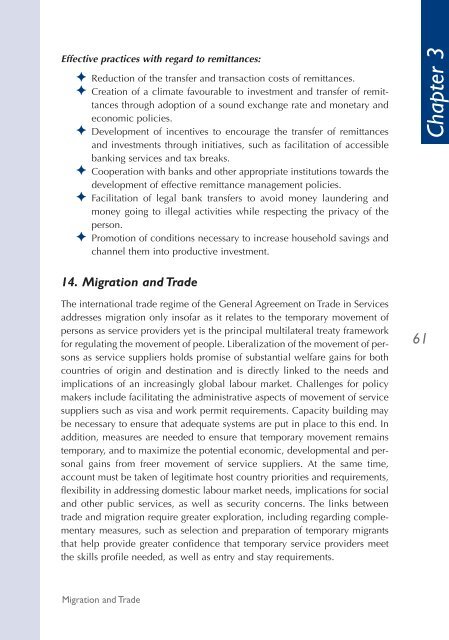Chapitre III - UNITAR
Chapitre III - UNITAR
Chapitre III - UNITAR
Create successful ePaper yourself
Turn your PDF publications into a flip-book with our unique Google optimized e-Paper software.
Effective practices with regard to remittances:<br />
Reduction of the transfer and transaction costs of remittances.<br />
Creation of a climate favourable to investment and transfer of remittances<br />
through adoption of a sound exchange rate and monetary and<br />
economic policies.<br />
Development of incentives to encourage the transfer of remittances<br />
and investments through initiatives, such as facilitation of accessible<br />
banking services and tax breaks.<br />
Cooperation with banks and other appropriate institutions towards the<br />
development of effective remittance management policies.<br />
Facilitation of legal bank transfers to avoid money laundering and<br />
money going to illegal activities while respecting the privacy of the<br />
person.<br />
Promotion of conditions necessary to increase household savings and<br />
channel them into productive investment.<br />
14. Migration and Trade<br />
The international trade regime of the General Agreement on Trade in Services<br />
addresses migration only insofar as it relates to the temporary movement of<br />
persons as service providers yet is the principal multilateral treaty framework<br />
for regulating the movement of people. Liberalization of the movement of persons<br />
as service suppliers holds promise of substantial welfare gains for both<br />
countries of origin and destination and is directly linked to the needs and<br />
implications of an increasingly global labour market. Challenges for policy<br />
makers include facilitating the administrative aspects of movement of service<br />
suppliers such as visa and work permit requirements. Capacity building may<br />
be necessary to ensure that adequate systems are put in place to this end. In<br />
addition, measures are needed to ensure that temporary movement remains<br />
temporary, and to maximize the potential economic, developmental and personal<br />
gains from freer movement of service suppliers. At the same time,<br />
account must be taken of legitimate host country priorities and requirements,<br />
flexibility in addressing domestic labour market needs, implications for social<br />
and other public services, as well as security concerns. The links between<br />
trade and migration require greater exploration, including regarding complementary<br />
measures, such as selection and preparation of temporary migrants<br />
that help provide greater confidence that temporary service providers meet<br />
the skills profile needed, as well as entry and stay requirements.<br />
Migration and Trade<br />
Chapter 3<br />
61
















